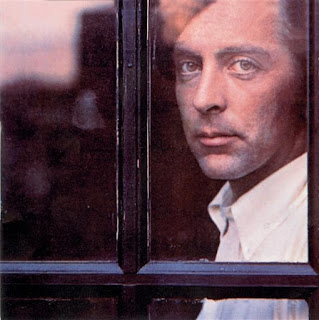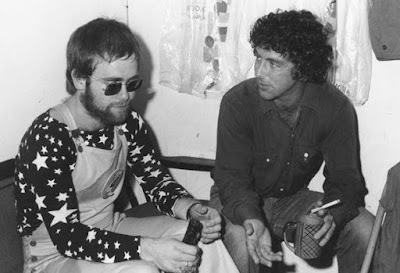David Thomas Ackles (February 27, 1937 – March 2, 1999) was an American singer-songwriter. He recorded four albums between 1968 and 1973. Although he never gained wide commercial success, he influenced other artists, especially British singer-songwriters such as Elvis Costello, Elton John and Phil Collins, all of whom are self-declared fans of Ackles. After Ackles's death ![]() Costello said, "It's a mystery to me why his wonderful songs are not better known."
Costello said, "It's a mystery to me why his wonderful songs are not better known."
 Costello said, "It's a mystery to me why his wonderful songs are not better known."
Costello said, "It's a mystery to me why his wonderful songs are not better known."Born February 20, 1937, Illinois, he was working in vaudeville by age four and in the mid-'40s played a character named Tucky Worden in Columbia's Rusty the Dog film series. His co-star was Dwayne Hickman, who would later go on to play Dobie Gillis on television.
 He attended the University of Southern California and took a year to go to school in Edinburgh, where he studied literature. He eventually got a degree in film studies, though he was proficient in the theatre, ballet, and choreography. He held several odd jobs after school and was eventually hired as a songwriter by Elektra.
He attended the University of Southern California and took a year to go to school in Edinburgh, where he studied literature. He eventually got a degree in film studies, though he was proficient in the theatre, ballet, and choreography. He held several odd jobs after school and was eventually hired as a songwriter by Elektra.He managed to parlay that assignment into a multi-record deal, and released a self-titled debut album in 1968. The album was met with considerable critical acclaim, but did not do well commercially. His follow-up, Subway to the Country, produced one of his most chilling songs, "Candy Man," which was about a war veteran exacting revenge by selling pornography to children.
Bernie Taupin, lyricist for Elton John, helped Ackles produce what was to be his best album, American Gothic, in 1972. The album again won heaps of praise from critics and peers, but Elektra gave up on Ackles' commercial prospects and dropped him after the ![]() album's release. Columbia gave him a shot and he released Five & Dime in 1973, but they also failed to market him effectively and dropped him when the album failed to chart.
album's release. Columbia gave him a shot and he released Five & Dime in 1973, but they also failed to market him effectively and dropped him when the album failed to chart.
His career in popular music cut short, Ackles returned to writing television scripts, along with work on ballet scores and some lecturing on commercial song writing. In 1981, a drunk driver rammed his car and his arm was badly damaged. A steel hip meant he spent six monthe in a wheelchair. It took years before he was able to return to the piano.
Ackles gave up on solo albums and went to work in film and theatre, eventually writing a musical, Sister Aimee, which was performed in Los Angeles in 1995. He settled on a six-acre horse farm in Tujunga with Janice, his wife of 26 years. She is the lady featured on the covers of the American Gothic album.  album's release. Columbia gave him a shot and he released Five & Dime in 1973, but they also failed to market him effectively and dropped him when the album failed to chart.
album's release. Columbia gave him a shot and he released Five & Dime in 1973, but they also failed to market him effectively and dropped him when the album failed to chart.His career in popular music cut short, Ackles returned to writing television scripts, along with work on ballet scores and some lecturing on commercial song writing. In 1981, a drunk driver rammed his car and his arm was badly damaged. A steel hip meant he spent six monthe in a wheelchair. It took years before he was able to return to the piano.
 When interviewed for Q Magazine in 1994, David expressed a wish to get back in touch with Bernie Taupin to record some new songs, but that hope was never fulfilled, although he did record a great deal of material over the years. In 1977, he was involved in student theatre production and had a success with Kurt Weill and Bertolt Brecht's Threepenny Opera for the University of Southern California. He taught song writing and theatre studies before his death from lung cancer.
When interviewed for Q Magazine in 1994, David expressed a wish to get back in touch with Bernie Taupin to record some new songs, but that hope was never fulfilled, although he did record a great deal of material over the years. In 1977, he was involved in student theatre production and had a success with Kurt Weill and Bertolt Brecht's Threepenny Opera for the University of Southern California. He taught song writing and theatre studies before his death from lung cancer.Although David overcame a bout of cancer during the mid 90’s, it cost him part of his left lung. He then became very unwell again in 1997 but clung on, through chemotherapy. Indeed, he remained remarkably cheerful, as if in denial of his illness, despite the obvious pain that he suffered towards the end. In doing this, David's bravery became an inspiration to the many people who knew him.
He died at Tujunga, California, on 2 March 1999, at the age of 62. (Info mainly from All Music)
He died at Tujunga, California, on 2 March 1999, at the age of 62. (Info mainly from All Music)


